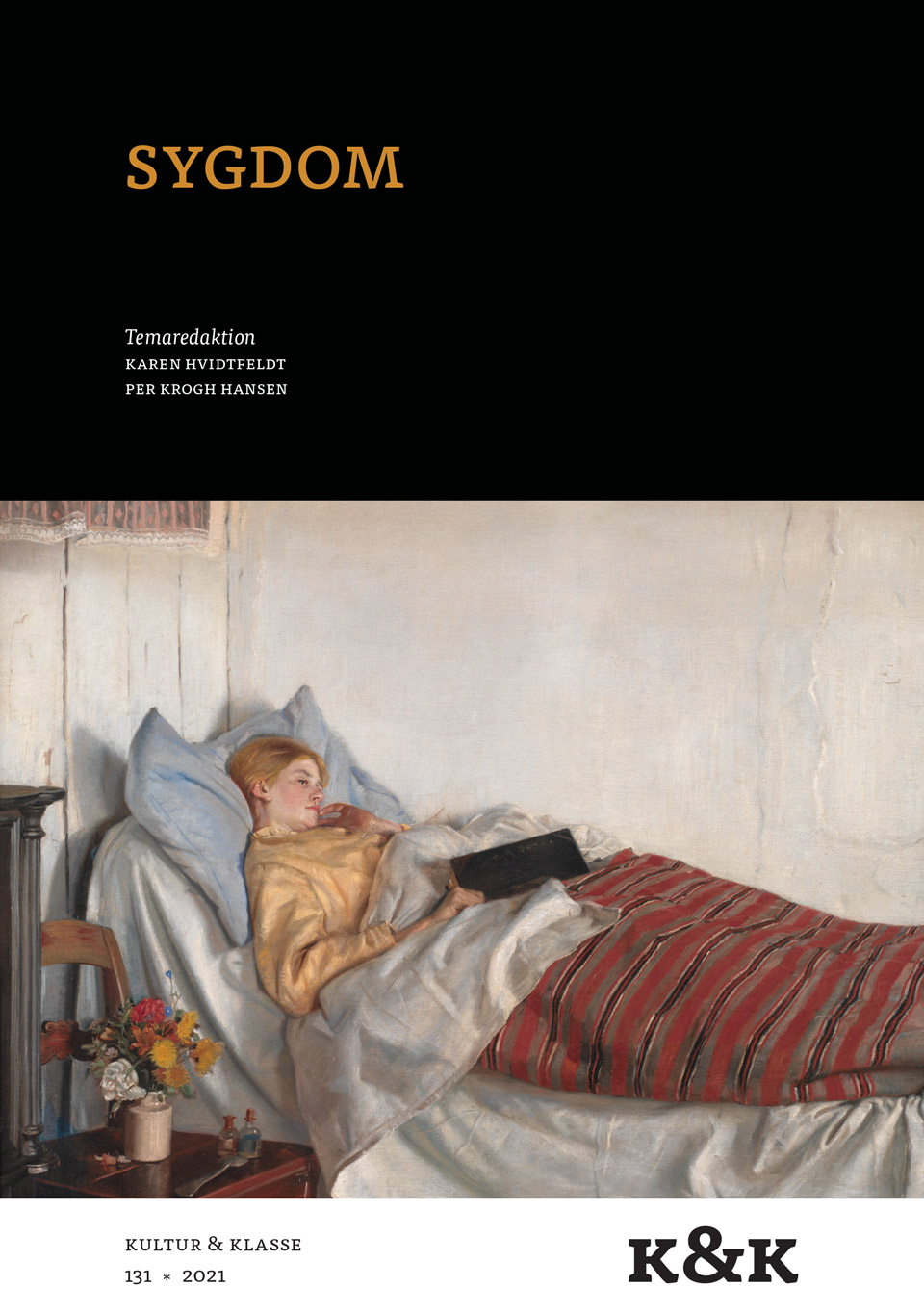Anoreksi og agens
Kropsfilosofiske overvejelser om Cecilie Linds patografi Scarykost
DOI:
https://doi.org/10.7146/kok.v49i131.127482Nøgleord:
Anoreksi, spiseforstyrrelser, agens, affekt, materialitet, patografi, sygdomsfortælling, Cecilie Lind, død, kropsfilosofiResumé
Cultural studies and gender studies hold long-standing traditions for studying people with eating disorders as either passive objects subjected to misogynist discourses or subversive agents that negotiate societal norms. In both cases, agency is primarily investigated as a phenomenon that unfolds between the anorectic individual and the surrounding society. In contrast, this article explores how the question of agency also unfolds within the anorectic her-/himself. It does so by setting up a dialogue between the anorectic testimony of Cecilie Lind’s pathography Scarykost (2016) and philosophical ideas of corporeality in feminist new materialism, affect theory, and phenomenology. Ultimately, the article argues that the anorectic subject is not a homogenous individual that can easily be classified as either passive or active, but comprises an infra-corporeal landscape of social, psychic, and biological forms of agency that struggle to determine the will of the anorectic “I.” In that way, the article pushes back on the tendency in cultural and gender studies to make generalizing claims about the anorectic’s subversive agency – or lack thereof.
Referencer
Ahmed, Sara. The Promise of Happiness. Durham: Duke University Press, 2010.
Barad, Karen. ”Getting Real: Technoscientific Practices and the Materialization of Reality.” Differences. A Journal of Feminist Cultural Studies 10 2 (1998): 87-128, doi.org/ 10.1215/9780822388128
Bennett, Jane. Vibrant Matter. A Political Ecology of Things. Durham: Duke University Press, 2010.
Bennett, Jane. Influx & Efflux. Writing up with Walt Whitman. Durham: Duke University Press, 2020.
Blackmann, Lisa. Immaterial Bodies: Affect, Embodiment, Mediation. London: Sage, 2012.
Bordo, Susan. Unbearable Weight: Feminism, Western Culture, and the Body. Los Angeles: University of California Press, 1993.
Bray, Abigail og Claire Colebrook. ”The Haunted Flesh: Corporeal Feminism and the Politics of (Dis)Embodiment.” Signs: Journal of Women in Culture and Society 24 1 (1998): 35-67.
Frank, Arthur W. The Wounded Storyteller: Body, Illness & Ethics. 2 udgave. Chicago og London:Chicago Univeristy Press, 2013 [1995].
Gordon, Richard. Anorexia and Bulimia: Anatomy of a Social Epidemic. Cambridge: Basil Blackwell, 1900.
Gregg, Melissa og Gregory J. Seigworth (red.). The Affect Theory Reader. Durham: Duke University Press, 2010.
Grosz, Elizabeth. Becoming Undone. Darwinian Reflections on Life, Politics, and Art. Durham: Duke University Press, 2011.
Gremillion, Helen. ”In Fitness and in Health: Crafting Bodies in Treatment of Anorexia Nervosa.” Signs: Journal of Women in Culture and Society 27 2 (2002): 381-414.
Haraway, Donna. ”Situated Knowledges. The Science Question in Feminism and the Privilige of Partial Perspective.” Feminist Studies 14 3 (1988): 575-599, doi.org/10.2307/ 3178066
Hawkins, Anna. ”Two Pathographies: A Study in Illness and Literature.” The Journal of Medicine and Philosophy 9 (1984): 231-252, doi 10.1093/jmp/9.3.231.
Hawkins, Anna. Reconstructing Illness: Studies of Pathographies. 2. Udgave. West Lafayette: Purdue University, 1999.
Huang, Benedicte de Thurah. ”Gurleske. Pigethed som æstetik og agens.” Kritik 215 (2015): 9-18
Kirby, Vicky. Telling Flesh. Telling Flesh. The Substance of the Corporeal. New York: Routledge, 1997.
Leder, Drew. The Absent Body. London og Chicao: Chicago University Press, 1990.
Lykke, Nina, Marietta Radomska og Tara Mehrabi. ”Queer Death Studies: Coming to Terms with Death, Dying and Mourning Differently.” Women, Gender & Research 19 3-4 (2019), doi: 10.7146/kkf.v28i2-3.116304 .
Manning, Erin. Always more than one: Individuation’s dance. Durham: Duke University Press, 2013.
Muldtofte, Lea. ”The Grace of My Perfect Skeleton: An Autoethnografic Analysis of the Anorectic Body.” Capacious: Journal for Emerging Affect Inquiry 1 3 (2018): 2-15, doi: 10.22387/CAP2018.17
Nesby, Linda Hamrin. ”Patografien som genre og funksjon: Ulla-Carin Lindquists Ro utan åror. En bok om livet och döden (2004) og Ole Robert Sundes Penelope er syk (2017).” Edda. Nordisk tidsskrift for litteraturforskning 106 1 (2019): 54-68, doi: 10.18261/issn. 1500-1989-2019-01-05.
Orbach, Susie. Hunger Strike: The Anorectic’s Struggle as a Metaphor of Our Age. Los Angeles: University of California Press, 1993.
Probyn, Elspeth. ”The Anorexic Body.” Body Invaters. Red. Arthur Kroker og Marilouise Kroker. New York: St. Martin’s, 1987. 201-212.
Schwartz, Camilla. ”Take me to Neverland: Androgynitet, hysteri og voksenfobi i ny dansk litteratur.” Edda. Tidsskrift for nordisk litteraturvidenskab 117 1 (2017): 24-42, doi: 10.18261/issn.1500-1989-2017-01-03
Schwartz, Camilla. ”Hvad nu hvis vi er i matrix: Spiseforstyrrelsen som tvetydigt motiv i nyere dansk litteratur.” Dansk Noter 1 (2019): 15-18.
Seaber, Emma. ”Reading Disorders: Pro-Eating Disorder Rhethoric and Anorexia Life-Writing.” Literature and Medicine 34 2 (2016): 484–508, doi: 10.1353/lm.2016.0023
Sestoft, Carsten. ”Noter om kunstens autonomi.” Kunstteori. Positioner i nutidig kunstdebat. Red. Hans Dam Christensen, Anders Michelsen og Jacob Wamberg. København: Borgen, 1999.
Sharma, Devika og Christian Dahl. K&K 41 116 (2013).
Skiveren, Tobias og Martin Gregersen. Den materielle drejning. Natur, teknologi og krop i (nyere) dansk litteratur. Odense: Syddansk Universitetsforlag, 2016.
Skiveren, Tobias. ”Ekstatisk nydelse i mere-end-menneskelige kroppe: Om tegn, affekt og kødets begær i Bjørn Rasmussens og Niels Henning Falk Jensbys debutromaner.” Edda. Tidsskrift for nordisk litteraturvidenskab 106 3 (2019): 181-195, doi: 10.18261/issn.1500-1989-2019-03-02.
Skiveren, Tobias. Kødets Poiesis: Kropumulige kroppe i ny dansk litteratur. Hellerup: Forlaget Spring (under udgivelse)
Skiveren, Tobias. ”Fictionality in New Materialism: (Re)Inventing Matter.” Theory, Culture & Society, onlineFirst 2020, doi: 10.1177/0263276420967408).
Sundhedsdatastyrelsen. Personer med spiseforstyrrelse: Registeranalyse af forekomst, nye tilfælde og aktivitet på tværs af sundhedsvæsenet i perioden 2010-2018, København: Sundhedsdatastyrelsen, 2020 (https://sundhedsdatastyrelsen.dk/da/tal-og-analyser/analyser-og-rapporter/sygdomme/spiseforstyrrelser)
Székely, Éva. Never Too Thin. Toronto: Women’s Press, 1988.
Valbak, Kristian. ”Spiseforstyrrelser.” Grundbog i psykiatri. Red. Erik Simonsen og Bo Møhl. København: Hans Reitzels Forlag, 2010. 459-472.
Downloads
Publiceret
Versioner
- 2021-07-27 (2)
- 2021-06-27 (1)
Citation/Eksport
Nummer
Sektion
Licens
Tidsskriftet følger dansk ophavsret.





